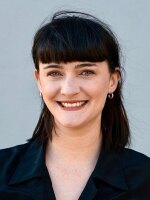Residents of San Diego’s South Bay often notice a rotten egg smell in the air. Now, they have a new tool to understand its health risk and how to respond.
The smell comes from hydrogen sulfide. It’s produced by untreated wastewater and sewage that flows from Mexico into the Tijuana River Valley and can cause headaches, dizziness and nausea.
A new online dashboard from the San Diego County Air Pollution Control District updates every 24 hours with hourly hydrogen sulfide readings from Nestor and San Ysidro. The dashboard lists the measurements in parts per billion, or ppB. One ppB is equivalent to a single drop of water in a 10,000-gallon pool.
The most recently published readings show 10.5 ppB in Nestor and 5.9 ppB in San Ysidro late Thursday night.
The website has guidance on what to do depending on the hydrogen sulfide level. If it’s above 5 parts per billion, people should limit outdoor activities if the odor bothers them. If it’s above 30, people should close doors and windows and use air purifiers.
Guidelines for each measurement level are available in Spanish here.
At a meeting Thursday, the San Diego Air Pollution Control District outlined plans to purchase 10,000 purifiers for affected residents using nearly $3 million in combined grants from the California Air Resources Board, the County and the City of Solana Beach.
“Staff has heard the board and community's desire to prioritize purifiers for the most vulnerable residents, including children, seniors and those with health conditions,” said Kathy Keehan, the district’s chief of planning, incentives and rule development. “We've also heard a need to prioritize those households most exposed to odors.”
Keehan said they’ll partner with schools, senior centers and health clinics to find people who need the purifiers.
Air pollution control officer Paula Forbis said local officials continue to ask for federal and state emergency declarations. They sent letters to President Joe Biden and Gov. Gavin Newsom last month.
“We highlighted that despite improving conditions, including repairs to infrastructure, cooler temperatures and reduced flows, we're still seeing unacceptably high levels of hydrogen sulfide in the community,” Forbis said.
National City Councilmember Marcus Bush said it could be time to ask the incoming Trump administration for the same.
“I don't care who it is and what party, red or blue,” he said. “I just want the emergency declared.”
The Air Pollution Control District plans to add a third hydrogen sulfide sensor at Imperial Beach City Hall. It’s expected to be up and running by the end of the month.
The district also plans to purchase a mobile monitoring vehicle and equipment.





